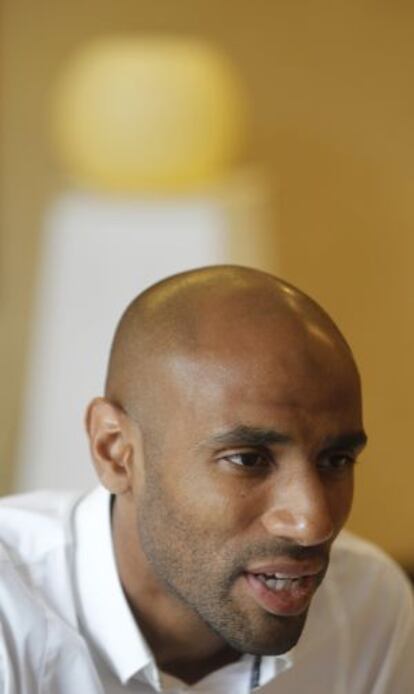"The West and the Muslim world have not learned to live side by side"
Frédéric Kanouté returns to Seville

Seville has been in raptures this week over the return of Frédéric Kanouté, one of the finest players ever to represent the red-and-white half of the city. Many former Sevilla players joined Kanouté on the pitch of the Sánchez Pizjuán to pay tribute to one of the key compenents of the side that won six trophies, and to support the fifth edition of the Champions for Africa charity match.
Kanouté, who has opened a soccer academy in Bamako in his native Mali, currently plays in China and works as a Unicef ambassador for underprivileged children in his home country.
Question. How’s it going in China?
Answer. Good, I’m enjoying a new experience after seven years at Sevilla. Everything is new for my family and we’re adapting as well as we can.
Q. Do you speak any Chinese?
A. I’m learning the odd word. In China you have to sort things out for yourself because hardly anyone speaks English or French, so you can imagine how many speak Spanish. Soccer is different here and I didn’t have a pre-season, so I’m a little off physically. Still, I’ve scored a few goals. The league is about to finish and I want to be strong for the next one, which starts in January.
Q. And now you’re back in Seville, maybe for the last time?
A. I don’t know yet where I’ll live when I leave China. But I will always come back to Seville. There is something I will never forget about this city and that is how people speak to me, how they stop me in the street and how much affection they have for me. I’ve never experienced that anywhere else. This city means a lot to me, I spent the best years of my career here. It’s a pleasure to be back, especially for a cause like this.
Q. You are a discreet player. You never seek attention, you don’t have any tattoos and you are deeply religious. What does your religion mean to you?
A. For me, it’s my reason for being. I try to live my religion every minute of every day, behind closed doors and in public.
Q. Why have you made charity work in Mali almost a way of life.
A. Through a sum of experiences. Maybe because of the education I received through my family, especially my father, for whom I have infinite respect. When I first visited Mali I was taken aback. When I saw how things were, I asked myself “How can you not help?” You have to. You have to learn to be supportive.
Q. Do you think the world owes Africa a debt?
A. I don’t like the expression of being in debt. I believe you have to be supportive through conviction. It is true that Africa has been treated extremely unjustly and that it is the responsibility of the rest of the world to help the continent. But Africans have to help themselves as well. The West and Africa, together, can change the delicate situation of my continent.
Q. What do you make of the controversy over the caricatures of Mohammed?
A. There are a lot of people in this world that like to provoke. They are provocative, but provocation also exists among Muslims. They want to do damage and sometimes the reactions of Muslims are not positive either. I think the West and the Muslim world have not learned to live side by side. That’s the problem.
Q. You were once fined by La Liga for showing a shirt supporting Palestine. Did that bother you?
A. Of course it bothered me, but what really bothers me is that are no sanctions in the other sense. I was just trying not to be an accomplice to the injustices suffered by the Palestinian people. In this world, the wrong people get sanctioned.
Q. You won six titles with Sevilla. Until recently the league wasn’t a two-horse race. Your former president, José María del Nido, said the Spanish league is shit. Do you agree?
A. Well, seeing how the season has started this year I hope the dynamic will change. It’s not good for a league to know where the champion will come from before it starts.
Tu suscripción se está usando en otro dispositivo
¿Quieres añadir otro usuario a tu suscripción?
Si continúas leyendo en este dispositivo, no se podrá leer en el otro.
FlechaTu suscripción se está usando en otro dispositivo y solo puedes acceder a EL PAÍS desde un dispositivo a la vez.
Si quieres compartir tu cuenta, cambia tu suscripción a la modalidad Premium, así podrás añadir otro usuario. Cada uno accederá con su propia cuenta de email, lo que os permitirá personalizar vuestra experiencia en EL PAÍS.
¿Tienes una suscripción de empresa? Accede aquí para contratar más cuentas.
En el caso de no saber quién está usando tu cuenta, te recomendamos cambiar tu contraseña aquí.
Si decides continuar compartiendo tu cuenta, este mensaje se mostrará en tu dispositivo y en el de la otra persona que está usando tu cuenta de forma indefinida, afectando a tu experiencia de lectura. Puedes consultar aquí los términos y condiciones de la suscripción digital.









































